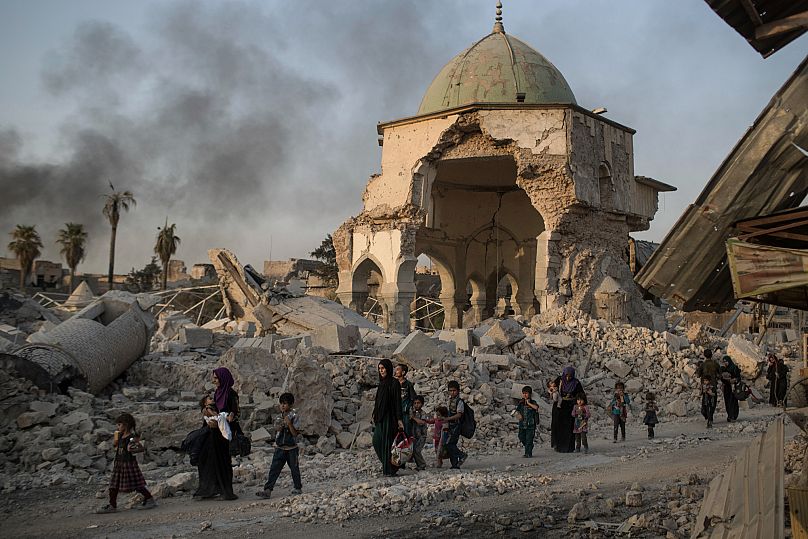The so-called Islamic State group detonated explosives at the 12th-century Mosul landmark in 2017.
Iraq has formally reopened the historic al-Nouri Grand Mosque in the northern city of Mosul, eight years after it was destroyed with explosives by the so-called Islamic State (IS) group.
 ADVERTISEMENT
ADVERTISEMENT
 ADVERTISEMENT
ADVERTISEMENT
Built in the second half of the 12th century, the mosque stood as an iconic landmark for around 850 years.
IS detonated explosives inside the building in 2017 as it struggled to retain control of the city in its battle with Iraqi military forces.
Iraqi Prime Minister Mohammed Shia al-Sudani said that the building's reconstruction "will remain a milestone, reminding all enemies of the heroism of Iraqis, their defence of their land, and their rebuilding of everything destroyed by those who want to obscure the truth."
"We will continue our support for culture and efforts to highlight Iraqi antiquities as a social necessity, a gateway to our country for the world, an opportunity for sustainable development and a space for youth to innovate," he added.
The mosque had been the site where IS announced its self-declared caliphate to the world in 2014.
Following the liberation of Mosul eight years ago, UNESCO, the UN's cultural agency, worked alongside Iraqi heritage and religious authorities to rebuild the site.
The reconstruction project raised $115 million (€98.2 million), with significant contributions coming from the EU and the United Arab Emirates.
Speaking of the restoration efforts, UNESCO said it was "not only an architectural challenge," but also "a symbolic act of revival."
The first phase of the project started in autumn 2018, when the site was demined and dangerous materials were removed.
Rubble was also sifted to find valuable fragments that could be preserved and used during the reconstruction work.
An Egyptian team won an international competition to design the mosque.
They showed the Iraqi public their design in May 2022, two years after a survey found that 70% of locals wanted the Al-Nouri prayer hall's essential features to be rebuilt, but some improvements to be added.
During preparatory work, four rooms dating from the 12th century, which are thought to have been used for ablutions, were discovered under the mosque's floor. They were then incorporated into the redesign.
The restoration project also rebuilt war-damaged churches in Mosul, as the city attempts to preserve the heritage of its dwindling Christian population.
Following IS' brutal rule over Mosul, only 20 Christian families remain as permanent residents in the city, down from a population of around 50,000 in 2003.











